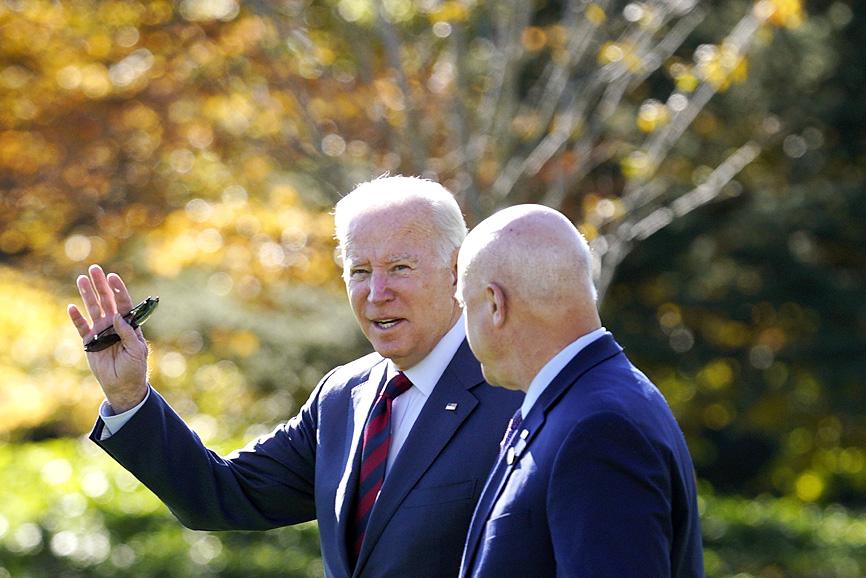The US is not encouraging Taiwanese independence — it is up to Taiwan to decide, US President Joe Biden said late on Tuesday after generating confusion with a comment suggesting that Taiwan is “independent.”
Speaking with reporters in New Hampshire, where he was promoting his recently signed infrastructure law, Biden said he told Chinese President Xi Jinping (習近平) in their virtual meeting on Monday that the US would abide by its Taiwan Relations Act.
Referring to Taiwan, he then said: “It’s independent. It makes its own decisions.”

Photo: Bloomberg
Biden later clarified as he was about to leave New Hampshire that “we [the US] are not encouraging independence.”
“We’re not going to change our policy at all,” he added.
Asked specifically about the “independent” comment, Biden said: “I said that they have to decide — they, Taiwan, not us.”
“We’re encouraging that they do exactly what the Taiwan act requires,” he said, likely referring to the 1979 Taiwan Relations Act, which has served as a cornerstone of the US’ Taiwan policy since official diplomatic ties were severed that year.
“That’s what we’re doing. Let them make up their mind. Period,” he said.
What part of the act Biden was referring to is unclear, as it does not mention Taiwanese independence or Taiwan deciding for itself on the issue of independence, something that Beijing has said it would not accept and would stop by force if necessary.
The comments came after Biden, in his meeting with Xi, reiterated his administration’s commitment to the “one China” policy, under which the US “acknowledges” that there is only one “China” across the Taiwan Strait and that the People’s Republic of China is the sole legitimate government representing “China.”
Biden underscored that the US “strongly opposes unilateral efforts to change the status quo, or undermine peace and stability across the Taiwan Strait,” a readout of the meeting said.
Speaking to reporters following the meeting between Biden and Xi, a senior official in the US administration reiterated that the US does not support Taiwanese independence.
It was just the latest comment by Biden to cause confusion regarding the US’ China policy and whether Washington is changing long-standing positions.
Last month, Biden suggested that the US would defend Taiwan if it were attacked by China — something that Washington has always inferred, but had never said outright.
The White House later issued a statement saying that US policy on the issue had not changed.
Also on Tuesday, White House National Security Adviser Jake Sullivan said that US engagement with China would intensify to ensure that competition between them does not veer into conflict.
Sullivan said in a Brookings Institution Webinar that the two leaders had agreed that “we would look to begin to carry forward discussion on strategic stability.”
“President Biden did raise with President Xi the need for a strategic stability set of conversations... That that needs to be guided by the leaders and led by senior empowered teams on both sides that cut across security, technology and diplomacy,” Sullivan added.
“You will see at multiple levels an intensification of the engagement to ensure there are guardrails around this competition, so that it doesn’t veer off into conflict,” he said.

The Central Election Commission has amended election and recall regulations to require elected office candidates to provide proof that they have no Chinese citizenship, a Cabinet report said. The commission on Oct. 29 last year revised the Measures for the Permission of Family-based Residence, Long-term Residence and Settlement of People from the Mainland Area in the Taiwan Area (大陸地區人民在台灣地區依親居留長期居留或定居許可辦法), the Executive Yuan said in a report it submitted to the legislature for review. The revision requires Chinese citizens applying for permanent residency to submit notarial documents showing that they have lost their Chinese household record and have renounced — or have never

A magnitude 5.6 earthquake struck off the coast of Yilan County at 12:37pm today, with clear shaking felt across much of northern Taiwan. There were no immediate reports of damage. The epicenter of the quake was 16.9km east-southeast of Yilan County Hall offshore at a depth of 66.8km, Central Weather Administration (CWA) data showed. The maximum intensity registered at a 4 in Yilan County’s Nanao Township (南澳) on Taiwan’s seven-tier scale. Other parts of Yilan, as well as certain areas of Hualien County, Taipei, New Taipei City, Taoyuan, Hsinchu County, Taichung and Miaoli County, recorded intensities of 3. Residents of Yilan County and Taipei received

Taiwan has secured another breakthrough in fruit exports, with jujubes, dragon fruit and lychees approved for shipment to the EU, the Ministry of Agriculture said yesterday. The Animal and Plant Health Inspection Agency on Thursday received formal notification of the approval from the EU, the ministry said, adding that the decision was expected to expand Taiwanese fruit producers’ access to high-end European markets. Taiwan exported 126 tonnes of lychees last year, valued at US$1.48 million, with Japan accounting for 102 tonnes. Other export destinations included New Zealand, Hong Kong, the US and Australia, ministry data showed. Jujube exports totaled 103 tonnes, valued at

BIG SPENDERS: Foreign investors bought the most Taiwan equities since 2005, signaling confidence that an AI boom would continue to benefit chipmakers Taiwan Semiconductor Manufacturing Co’s (TSMC, 台積電) market capitalization swelled to US$2 trillion for the first time following a 4.25 percent rally in its American depositary receipts (ADR) overnight, putting the world’s biggest contract chipmaker sixth on the list of the world’s biggest companies by market capitalization, just behind Amazon.com Inc. The site CompaniesMarketcap.com ranked TSMC ahead of Saudi Aramco and Meta Platforms Inc. The Taiwanese company’s ADRs on Tuesday surged to US$385.75 on the New York Stock Exchange, as strong demand for artificial intelligence (AI) applications led to chip supply constraints and boost revenue growth to record-breaking levels. Each TSMC ADR represents